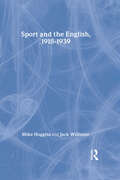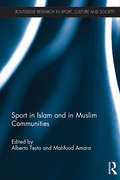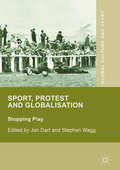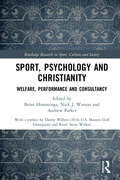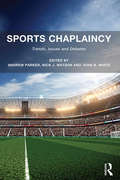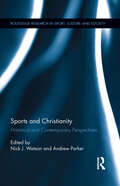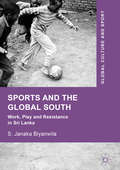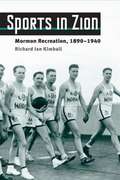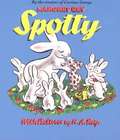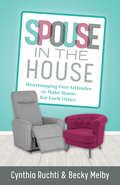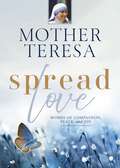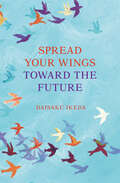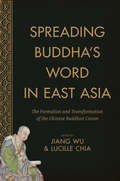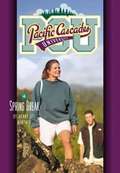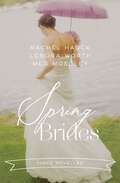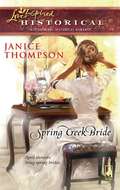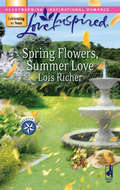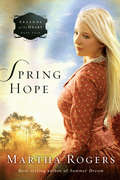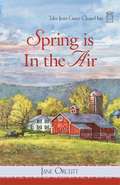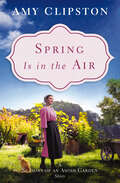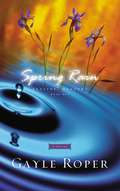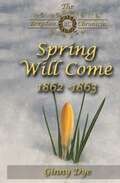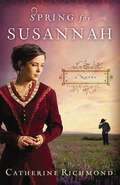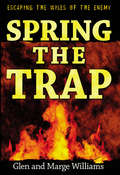- Table View
- List View
Sport and the English, 1918-1939: Between the Wars (Modern Grammar Workbooks Ser.)
by Jack Williams Mike HugginsA thorough, innovative yet entertaining and readable analysis of sport as an expression of the values and social relations of a nation. Covering the years between the two World Wars, the central place of sport in English life is brought into sharp focus, providing insight into issues of gender, class, religion and locality, ideas of morality, continuity and change, and what it meant to be English during this pivotal time. Themes include: the nature of sport and its place in national life how sport was portrayed in the media and through the sports stars of the age tradition and change in sport and in society gaining meaning from sport: the pursuit of pleasure, a moral code, and ideas of Englishness class, social conflict and social cohesion. This original and lucid study is ideal for students of sport and social history, and anyone with an interest in the social role of sport.
Sport in Islam and in Muslim Communities (Routledge Research in Sport, Culture and Society)
by Mahfoud Amara Alberto TestaAs Islam’s visibility in global society increases, Muslim populations grow, and Muslim countries compete to take up positions at the heart of global sport, the interplay between sport and Islam becomes ever more illuminating. Sport in Islam and in Muslim Communities is the first book to analyse this relationship through a pluralist lens, exploring the questions it raises about contemporary Islam, globalisation, and the challenges faced by (in particular young) Muslims in negotiating their place in global society. With contributions from Muslim and non-Muslim authors, the book approaches an array of contemporary issues, from the role of sport in gender, youth and political identities in Islam and Muslim societies to sport policy in Muslim countries, sport’s role among Muslim minorities and sport marketing’s relationship to Muslim cultures. Drawing on sociology, anthropology, political science, Islamic studies and sport studies, Sport in Islam and in Muslim Communities not only examines the significance of sport in Islam, but helps to draw wider conclusions on religious identity in sporting settings and the interplay between sport, gender, political ideology and consumer culture.
Sport, Protest and Globalisation: Stopping Play (Global Culture and Sport Series)
by Jon Dart and Stephen WaggThis volume is built around three assumptions - first, that for huge numbers people around the world, including many sport lovers, there are more important things in life than sport; second, that the governance of sport is in many ways problematic and needs to be confronted; and, third, that contrary to the still-popular belief that sport and politics don't mix, sport often provides an ideal theatre for the enacting of political protest. The book contains studies of a range of protests, stretching back to the death of suffragist Emily Davison at the Derby of 1913 and encompassing subsequent protests against the exclusion of women from the sporting arena; the Berlin Olympics of 1936; Western imperialism; the Mexico Olympics, 1968; the state racism of apartheid in South Africa; the effect of the global golf industry on ecosystems; Israeli government policy; resistance to the various attempts to bring the Olympic Games to Canadian and American cities; the cutting of welfare benefits for disabled British citizens; class privilege in the UK; Russian anti-gay laws; and high public spending on sport mega-events in Brazil. The collection will be of interest to scholars and students with an interest in Sports Studies, History, Politics, Geography, Cultural Studies and Sociology.
Sport, Psychology and Christianity: Welfare, Performance and Consultancy (Routledge Research in Sport, Culture and Society)
by Andrew Parker Nick J. Watson Brian HemmingsThe majority of sport psychology research to date has been underpinned and driven by a secular perspective. There is an urgent need for sport psychologists to better understand the relevance of Christian faith in athletes’ sporting experiences and day-to-day lives in order to improve their performance and well-being. Sport, Psychology and Christianity is the first book to consider the relationship between sport psychology provision and Christianity from a welfare and performance perspective. Bringing together contributions from leading scholars in the field, the book includes chapters on: The role of faith in sport injury rehabilitation Christian belief and resilience during injury The pitfalls of perfectionism in sport Collaboration between sport psychologist and club chaplain Ethical considerations when working with spiritual athletes Reflective practice in sport psychology consultancy Offering a holistic approach to improving athlete welfare and performance where faith and spirituality are core tenets of well-being, this volume is a critical and timely resource for students, researchers and practitioners working in sport psychology; sport and spirituality; or religion, sports chaplaincy and allied roles and professions.
Sports Chaplaincy: Trends, Issues and Debates
by Andrew Parker John B. White Nick J. WatsonThis ground-breaking book provides an in-depth analysis of the theory and practice of sports chaplaincy in a global context. Written in an accessible style, yet based on academic evidence and theory, the contributors include those leading major national chaplaincy organisations located in the UK, US, Australia and Continental Europe, as well as chaplains and sport psychologists working in elite and amateur sport and those involved in teaching pastoral theology. Providing a rich and informative source of knowledge and inspiration for practitioners, athletes, academics and those interested in the general relationship between sport and faith, contributors also address the provision of sports chaplaincy at sporting mega-events, including the Olympic Games. This much needed overview of chaplaincy provision in sport across a range of national and international contexts and settings, including both catholic and protestant perspectives, is the first collection of its kind to bring together leading scholars in sports chaplaincy with a view to providing professional accreditation and training amidst the fast-emerging field of sports theology.
Sports and Christianity: Historical and Contemporary Perspectives (Routledge Research in Sport, Culture and Society #19)
by Andrew Parker Nick J. WatsonThis interdisciplinary text examines the sports-Christianity interface from Protestant and Catholic perspectives. In addition to a "systematic review of literature," field-pioneering contributors such as Michael Novak, Shirl Hoffman, Joseph Price and Robert Higgs address a wide range of topics from the sporting world, including biblical athletic metaphors, disability, evangelism, professionalism and celebrity, humility and pride, genetic enhancement technologies, stereotypes, sport as art and British and American historical analyses of sport and Christianity. Insightful chapters from Scott Kretchmar, one of the world’s leading philosophers of sport, and Father Kevin Lixey, the head of the Vatican’s ‘Church and Sport’ office (2004-), add further depth and breadth to this book, making it accessible and interesting to academic and practitioner audiences alike. Within the context of this relatively new and rapidly expanding area of inquiry, this collection provides a unique and important addition to the current literature for both undergraduate and postgraduate students, and serves as a point of reference for scholars of theology and religious studies, psychology, health studies, ethics and sports studies. The book may also be of interest to physical educators and sports coaches who wish to adopt a more "holistic" and ethical approach to their work. As modern sport is often intertwined with commercial and political agendas, this book offers an important corrective to the "win-at-all-costs" culture of modern sport, which cannot be fully understood through secular ethical inquiry.
Sports and The Global South: Work, Play And Resistance In Sri Lanka (Global Culture and Sport Series)
by S. Janaka BiyanwilaThis book reimagines the pleasures of sports and provides a critical perspective from the Global South. Analysing the spread of sports markets in Sri Lanka along with a range of struggles, the book highlights how the celebration of ‘sportive nationalism,’ promoting sports markets in the Global South reinforces patriarchal ethno-nationalist authoritarian sports cultures.By explaining how the realm of social reproduction involving households and communities is integral for play and sports, the book challenges the market-driven ‘sports and development’ agenda while arguing for a ‘sports commons.’ By foregrounding issues of justice and care, the book highlights how struggles for recognition, redistribution and representation are central to reimagining sports within an alternative notion of work, play and resistance.
Sports in Zion: Mormon Recreation, 1890-1940 (Sport and Society)
by Richard Ian KimballIf a religion cannot attract and instruct young people, it will struggle to survive, which is why recreational programs were second only to theological questions in the development of twentieth-century Mormonism. In this book, Richard Ian Kimball explores how Mormon leaders used recreational programs to ameliorate the problems of urbanization and industrialization and to inculcate morals and values in LDS youth. As well as promoting sports as a means of physical and spiritual excellence, Progressive Era Mormons established a variety of institutions such as the Deseret Gymnasium and camps for girls and boys, all designed to compete with more "worldly" attractions and to socialize adolescents into the faith. Kimball employs a wealth of source material including periodicals, diaries, journals, personal papers, and institutional records to illuminate this hitherto underexplored aspect of the LDS church. In addition to uncovering the historical roots of many Mormon institutions still visible today, Sports in Zion is a detailed look at the broader functions of recreation in society.
Spotty
by Margret ReyTired of being treated differently by his family just because he is spotted and the other rabbits are white, Spotty sets out on his own to seek acceptance. This edition of the original 1940s classic, with its vintage pictures and optimistic ending, offers a story that still needs to be told.
Spouse in the House: Rearranging Our Attitudes to Make Room for Each Other
by Cynthia Ruchti Becky MelbyA frank and funny look at what to do when together is too closeTwo's company, especially for those who love each other. So what happens when--due to retirement, working from home, or even running a business together--spouses find that being in the same space all the time is awkward, complex, annoying, and just plain challenging? How can partners co-exist without co-exhausting each other?Cynthia Ruchti and Becky Melby know all too well how adjusting to a new, all-the-time closeness can cause the bliss of marriage to form blisters. Drawing from their experiences, and from men and women across the country in the same situation, the authors take a deep breath and dive into the root causes of the discomfort. They dig into the ways God's Word addresses the topic, and they offer practical tips for learning the spiritual, emotional, relational, and even physical steps that can help readers replace irritation with peace.For any Christian who wants their home to be a refuge of peace and serenity for all--not just themselves--and who wants to know they aren't alone in the mental and physical claustrophobia of too much togetherness, Spouse in the House is a vulnerable, charming, and pragmatic breath of hope.
Spread Love: Words of Compassion, Peace, and Joy
by Mother TeresaMother Teresa's heartfelt wisdom--collected here into an inspirational 365-day devotional--offers you comfort, peace, and love amid the noise, busyness, and confusion around you.Spread Love includes:365 daily inspirational readingsshort and powerful meditationssimple everyday prayersWith so much happening in the world, are you looking for goodness and guidance? This year-long devotional contains a collection of encouraging quotes, stories, prayers, and teachings from the beloved Mother Teresa. Her daily guidance continues to reach the needs and circumstances of those who are thirsty for inspiration and spiritual nourishment in entries that are easy to understand and absorb.Let Mother Teresa's words of wisdom help you live a fuller and happier life, closer to the Lord and able to serve your community more effectively. Each of the 365 entries offers you the opportunity to begin any time of the year and find nourishment for a whole year.
Spread Your Wings Toward the Future
by Daisaku IkedaDaisaku Ikeda has spent a lifetime traveling for peace around the world. In these essays about countries from Canada and Chile to Russia and Spain to Thailand and India, you'll learn about the places he's been, the people he's met, and the wisdom he's learned. Most of all you'll be inspired to take flight on your own wings and soar into the future.
Spreading Buddha's Word in East Asia
by Lucille Chia Jiang WuA monumental work in the history of religion, the history of the book, the study of politics, and bibliographical research, this volume follows the making of the Chinese Buddhist canon from the fourth century to the digital era. Approaching the subject from a historical perspective, the book ties the religious, social, and textual practices of canon formation to the development of East Asian Buddhist culture and opens up the study of Chinese Buddhist texts to readers interested in the evolution of Chinese writing in general and the Confucian and Daoist traditions in particular. The collection undertakes extensive readings of major scriptural catalogs from the early manuscript era as well as major printed editions, including the Kaibao Canon, Qisha Canon, Goryeo Canon, and Taisho Canon. Contributors add fascinating depth to such understudied issues as the historical process of compilation, textual manipulation, physical production and management, sponsorship, the dissemination of various editions, cultic activities surrounding the canon, and the canon's reception in different East Asian societies. The Chinese Buddhist canon is one of the most enduring textual traditions in East Asian religion and culture, and through this exhaustive, multifaceted effort, an essential body of work becomes part of a new, versatile narrative of East Asian Buddhism that has far-reaching implications for world history.
Spreading Buddha's Word in East Asia: The Formation and Transformation of the Chinese Buddhist Canon (The Sheng Yen Series in Chinese Buddhist Studies)
by Lucille Chia Jiang WuA monumental work in the history of religion, the history of the book, the study of politics, and bibliographical research, this volume follows the making of the Chinese Buddhist canon from the fourth century to the digital era. Approaching the subject from a historical perspective, it ties the religious, social, and textual practices of canon formation to the development of East Asian Buddhist culture and enlivens Chinese Buddhist texts for readers interested in the evolution of Chinese writing and the Confucian and Daoist traditions.The collection undertakes extensive readings of major scriptural catalogs from the early manuscript era as well as major printed editions, including the Kaibao Canon, Qisha Canon, Goryeo Canon, and Taisho Canon. Contributors add fascinating depth to such understudied issues as the historical process of compilation, textual manipulation, physical production and management, sponsorship, the dissemination of various editions, cultic activities surrounding the canon, and the canon's reception in different East Asian societies. The Chinese Buddhist canon is one of the most enduring textual traditions in East Asian religion and culture, and through this exhaustive, multifaceted effort, an essential body of work becomes part of a new, versatile narrative of East Asian Buddhism that has far-reaching implications for world history.
Spring Break (PCU #4)
by Wendy Lee NentwigCooper, a former New York model, tries to adjust to what she considers a normal life with a normal boyfriend at a college in Seattle, but a trip back home over spring break convinces her that she cannot run from herself.
Spring Brides: A Year of Weddings Novella Collection (A Year of Weddings Novella)
by Lenora Worth Rachel Hauck Meg MoseleyHappily ever after begins today. The honor of your presence is requested at three spring weddings . . .A March Bride by Rachel HauckSusanna Truitt (Once Upon a Prince) is three weeks from royalty. She&’ll soon marry King Nathaniel II of Brighton Kingdom. But when the government insists she renounce her American citizenship before the wedding, coupled with the lack of involvement by family and friends, Susanna&’s heart begins to doubt whether this marriage is God's plan for her.An April Bride by Lenora WorthBride-to-be Stella Carson cannot wait another day to marry soldier Marshall Henderson. But when Marshall returns home to Louisiana, it becomes clear to them both that he is not the man he used to be.With only weeks until the wedding, Stella and Marshall must choose between a marriage built on the past and faith in long-ago love or a very different future than the one Stella imagined.A May Bride by Meg MoseleyEllie Martin, a country girl living in Atlanta, has dreamed of a traditional wedding all her life, but she&’s missing a key ingredient to her plans for the future: a groom. Then Ellie meets Gray Whitby—at a wedding of all places. But when Ellie jeopardizes her own future for the sake of her sister, Gray feels like he'll always be second to Ellie's family. Can Ellie and Gray find their own way together amidst the demands and perceptions of others, or will their romance end before it has truly begun?
Spring Creek Bride
by Janice ThompsonAfter the lovely Spring Creek, Texas, is overtaken by saloons and disorderly conduct, Ida Mueller makes plans to save the town. But one look into gambling hall owner Mick Bradley's eyes has the plucky beauty hearing wedding bells. Original.
Spring Flowers, Summer Love (Serenity Bay Series, Book #3)
by Lois RicherDesperate to save her father's tree nursery, Rowena Davis came home to Serenity Bay to negotiate a deal with the new owner, Connor Wingate. But who was this stern businessman who asked her to landscape Wingate Manor in exchange for the deed to Davis Nursery? Rowena hoped that beneath Connor's gruff exterior he was a man of faith and honor. Could God's plan for her future somehow include this man?
Spring Hope (Seasons of the Heart #4)
by Martha RogersCan runaway Libby Cantrell finally get a new start? Libby Cantrell&’s life has gone from bad to worse since her mother&’s death. After working in a brothel to support her abusive father, she sees no hope for her future until one cold winter night when she finds the courage to escape. When she collapses in Portersfield, Texas, exhausted, ill, and hungry, Sheriff Cory Muldoon finds her and takes her to the doctor. Against Cory&’s better judgment, Seth and Erin Winston take her in and offer her a job as a nanny for their young son. As a minister, Seth sees it as his duty to take care of her. As a deputy, Cory needs to know the truth about her even as he is attracted to the waif of a young woman.As Cory&’s feelings for her grow and winter becomes spring, will he be able to accept her as she is now and truly forget and forgive her sordid past?
Spring Is in the Air (Tales from Grace Chapel Inn #26)
by Jane OrcuttAbout the Tales from Grace Chapel Inn series: Once readers visit the charming village of Acorn Hill, they'll never want to leave. Three sisters -- Louise, a widow from Philadelphia; Alice, an unmarried nurse who lived with her father; and Jane, a divorced chef from San Francisco -- reunite in the sleepy town after their father's death and turn the family home into a charming bed-and-breakfast. Here the sisters rekindle old memories, rediscover their childhood bonds, revel in the blessings of friendship, and meet fascinating guests along the way. Spring comes to Acorn Hill and brings with it birds, budding flowers and a whole new set of challenges for the Howard sisters. While Louise becomes involved in the creation of the town's official website, Jane helps coach the local Little League team and Alice befriends an Amish girl who's about to make the biggest decision of her life. Meanwhile, the sisters host a family who are building something very interesting in the backyard. When spring is in the air, excitement is just around the corner.
Spring Is in the Air: A Seasons Of An Amish Garden Story (Seasons of an Amish Garden Stories)
by Amy ClipstonIn Amy Clipston's new novella collection, young Amish couples manage a community garden to raise money for a good cause, harvesting friendships and love along the way.As the youth of Bird-in-Hand, Pennsylvania, plant a garden in memory of their friend, Katie Ann begins to worry that her older brother, Ephraim, is dating her best friend. What if she somehow loses them both? But Christian, a new boy in the community, also works in the garden—and falling for him may be exactly the distraction, and lesson, that Katie Ann needs.
Spring Rain (Seaside Seasons #1)
by Gayle RoperIn this first book of the Seaside Seasons series, Leigh Spenser, a young teacher and the single mother of ten-year-old Billy, is thrown into conflict. Clay Wharton, the boy's estranged father, comes home to Seaside, New Jersey, to await his twin brother's death from AIDS. Threats against Billy's life ratchet the tension tighter, as Leigh wrestles with both tough and tender feelings for her old flame. Clay's own conflict, as he seeks to come to grips with his brother's lifestyle choices and the needs of the boy he fathered, underline the issue of God's forgiveness in the hearts -- and lives -- of this modern-day family. An emotionally gripping read!From the Trade Paperback edition.
Spring Will Come (The Bregdan Chronicles #3)
by Ginny DyeVolume 3 of the Bregdan Chronicles, Spring Will Come, continues the sweeping historical saga that now encompasses the second year of the American Civil War. As her beloved city of Richmond is transformed into a deadly Civil War battlefield, spirited Carrie Cromwell puts her medical skills to use in a Confederate hospital. Yet she struggles to understand the prejudice of her fellow Southerners. Does she really want the South to win? And will the war cost her the man she loves? Meanwhile, in the North, Rose and Moses have found freedom at last--only to be separated by war. Can Moses, now a Union spy, elude those searching for him as a runaway slave? Rose, inspired by a courageous woman, returns to Virginia to teach in a contraband camp.
Spring for Susannah
by Catherine RichmondHundreds of miles from home, Susannah faces an uncertain future as a mail-order bride on the untamed Dakota prairie. When her parents die suddenly, and no suitors call, Susannah resigns herself to the only option available: becoming a mail-order bride. Agreeing to marry her pastor's brother, Jesse, Susannah leaves the only home she's ever known for the untamed frontier of the Dakota Territory. Her new husband is more loving and patient with her than she believes she deserves. Still, there is also a wildness to him that mirrors the wilderness surrounding them. And Susannah finds herself constantly on edge. But Jesse's confidence in her--and his faith in God's perfect plan--slowly begin to chip away at the wall she hides behind. When she miscarries in the brutal Dakota winter, Susannah's fledgling faith in herself and in God begins to crumble. Still, Jesse's love is unwavering. Just when it seems like winter will never end, Susannah finally sees the first tentative evidence of spring. And with it, the realization that more than the landscape has changed. She looks to the future with a renewed heart. Yet in her wildest dreams, she couldn't predict all that awaits her.
Spring the Trap: Escaping the Wiles of the Enemy
by Glenn Williams Marge Williams"Satan is an enemy to be respected and understood," write Glen and Marge Williams. But Spring the Trap will do more than help you understand him. It will give you the tools to defeat him.Spring the Trap is written in a simple, conversational style. Glen and Marge Williams take a profoundly complex subject and represent it in a manner that will be embraced by all. Compare and contrast the role of Jesus the Rescuer and His angels with that of Satan and his demonic forces, find out just who is Lord of your desires and motives, and learn how to realign your life with God and His purposes. Any reader who embraces the wisdom of Spring the Trap stands on the threshold of one of the most exciting experiences of his life. About the author: Self-described as “ordinary people,” Glen and Marge Williams met Jesus in 1972 and made a commitment to“do what Jesus called them to do, whatever it was.” Since then, God has used them in a powerful ministry of deliverance, healing, and signs and wonders. They were ordained in 1990. The Williams base their ministry in Fresno, California, where they attend The Peoples Church.
